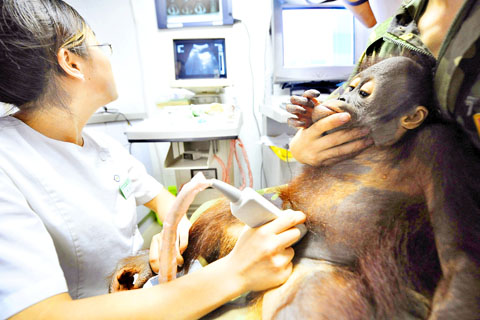Minister of Health Lin Fang-yue (林芳郁) stepped down yesterday over panic caused by the discovery of contaminated Chinese dairy ingredients and what critics said were belated and inconsistent measures to protect the public and ensure consumer confidence.
“The Department of Health’s [DOH] decision, made for efficiency’s sake, caused misunderstandings and shattered consumer confidence. I should take responsibility,” Lin said at a press conference yesterday morning after attending the weekly Cabinet meeting, during which he tendered his resignation to Premier Liu Chao-shiuan (劉兆玄).
Lin’s resignation was approved later yesterday, making him the first official in President Ma Ying-jeou’s (馬英九) administration to step down. The DOH was first blamed for its slow reaction to and mismanagement of the crisis involving Chinese dairy products tainted with the chemical melamine, and then for its inconsistent decisions.

PHOTO: AP
Deputy ministers of health Sung Yen-jen (宋晏仁) and Cheng Shou-hsia (鄭守夏) tendered resignation letters together with Lin.
Liu also approved the resignation of Bureau of Food Safety (BFS) Director Hsiao Tung-ming (蕭東銘).
Late last night, Presidential Office Deputy Secretary-General Yeh Ching-chuan (葉金川), a public health expert, was named as the next health minister.
Critics said the department should have banned dairy imports from China, checked with importers to see if imported products were tainted, and ordered an inspection or sampling of Chinese imports that had reached Taiwan.
Lin’s resignation comes as many consumers and businessmen express frustration over the DOH’s “loose” food inspection standards.
Late on Wednesday night, Sung told a press conference that the DOH had decided to loosen the food safety standard for melamine from 0 parts per million (ppm) to 2.5ppm, meaning that products containing up to 2.5ppm of the chemical could still enter the Taiwanese market.
Based on the new standard, the products of two food companies, which tested positive for melamine under the stricter standard, were allowed to go back on sale, sparking consumer anger.
The DOH said the revised standard was applied after taking into consideration instrument sensitivity and standards in other countries.
Executive Yuan Spokeswoman Vanessa Shih (史亞平) told a press conference yesterday that Liu met with Lin in the afternoon and expressed the hope that Lin would remain in his post.
“But Minister Lin insisted on resigning,” Shih said.
Liu praised Lin for his handling of the controversy, saying the DOH had taken accurate and forthright action from the beginning of the incident to impose bans on imports, to locate the whereabouts of tainted raw materials and to require questionable foodstuffs to be pulled from shelves, Shih said.
Liu had also expressed his admiration over Lin taking political responsibility for the late change in testing standards for the concentration of melamine that caused the unrest, and thanked him for his contributions over the past four months, Shih said.
Later yesterday afternoon, Lin was questioned by Control Yuan member Cheng Jen-hung (程仁宏), who has launched a probe to determine if there were any irregularities or instances of negligence in the government’s handling of the case.

SECURITY: As China is ‘reshaping’ Hong Kong’s population, Taiwan must raise the eligibility threshold for applications from Hong Kongers, Chiu Chui-cheng said When Hong Kong and Macau citizens apply for residency in Taiwan, it would be under a new category that includes a “national security observation period,” Mainland Affairs Council (MAC) Minister Chiu Chui-cheng (邱垂正) said yesterday. President William Lai (賴清德) on March 13 announced 17 strategies to counter China’s aggression toward Taiwan, including incorporating national security considerations into the review process for residency applications from Hong Kong and Macau citizens. The situation in Hong Kong is constantly changing, Chiu said to media yesterday on the sidelines of the Taipei Technology Run hosted by the Taipei Neihu Technology Park Development Association. With

CARROT AND STICK: While unrelenting in its military threats, China attracted nearly 40,000 Taiwanese to over 400 business events last year Nearly 40,000 Taiwanese last year joined industry events in China, such as conferences and trade fairs, supported by the Chinese government, a study showed yesterday, as Beijing ramps up a charm offensive toward Taipei alongside military pressure. China has long taken a carrot-and-stick approach to Taiwan, threatening it with the prospect of military action while reaching out to those it believes are amenable to Beijing’s point of view. Taiwanese security officials are wary of what they see as Beijing’s influence campaigns to sway public opinion after Taipei and Beijing gradually resumed travel links halted by the COVID-19 pandemic, but the scale of

A US Marine Corps regiment equipped with Naval Strike Missiles (NSM) is set to participate in the upcoming Balikatan 25 exercise in the Luzon Strait, marking the system’s first-ever deployment in the Philippines. US and Philippine officials have separately confirmed that the Navy Marine Expeditionary Ship Interdiction System (NMESIS) — the mobile launch platform for the Naval Strike Missile — would take part in the joint exercise. The missiles are being deployed to “a strategic first island chain chokepoint” in the waters between Taiwan proper and the Philippines, US-based Naval News reported. “The Luzon Strait and Bashi Channel represent a critical access

Pope Francis is be laid to rest on Saturday after lying in state for three days in St Peter’s Basilica, where the faithful are expected to flock to pay their respects to history’s first Latin American pontiff. The cardinals met yesterday in the Vatican’s synod hall to chart the next steps before a conclave begins to choose Francis’ successor, as condolences poured in from around the world. According to current norms, the conclave must begin between May 5 and 10. The cardinals set the funeral for Saturday at 10am in St Peter’s Square, to be celebrated by the dean of the College